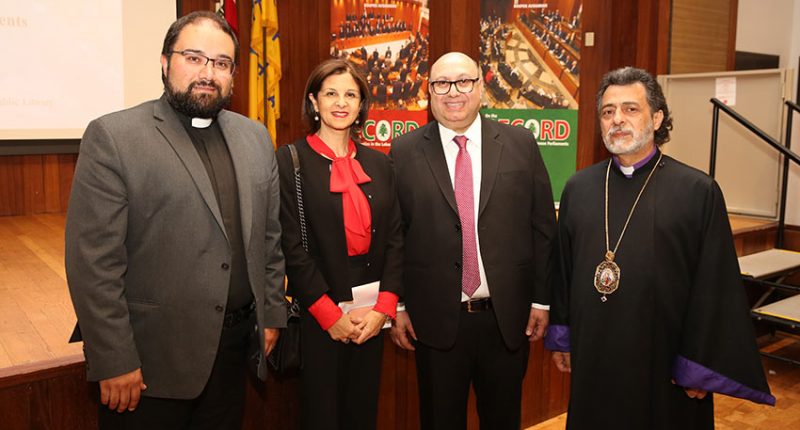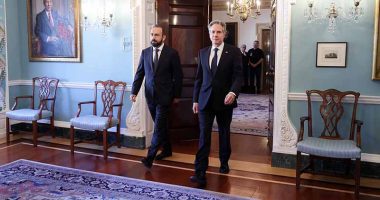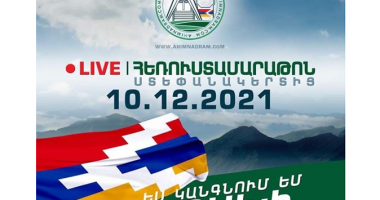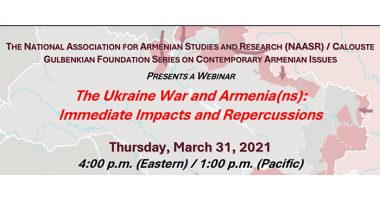NORTHRIDGE — On Thursday, April 11, 2019, at the Glendale Central Public Library, the Armenian Studies Program (ASA) at California State University, Northridge (CSUN) and Haigazian University (HU), Beirut, organized a presentation of attorney Roupen Avsharian’s two-volume book, titled On the Record: Armenian Deputies in the Lebanese Parliaments, published by the HU Press. The event, which was also co-sponsored by the Armenian Bar Association, took place under the High Patronage of the Consul General of Lebanon, Her Excellency Ms. Mirna Khawly, in the presence of a full capacity audience.
CSUN Armenian Studies Program Director Dr. Vahram Shemmassian in his opening remarks highlighted the important characteristics of the two tomes comprising a total of 1,336 pages: meticulously researched, lucidly written, highly analytical, generously illustrated, unique as a phenomenon given no other confessional/political group in Lebanon has produced such work, and underscoring the contribution of Armenians to the welfare of Lebanon in general.
Dr. Shemmassian then introduced the Consul General, whose career path has taken her to Yerevan, Armenia, among other diplomatic posts. In her remarks, Ms. Khawly thanked the organizers and the author, and mentioned that Armenia and the Armenians had a special place in her mind and heart.
Dr. Hasmig Baran, Chairperson of the HU Board of Trustees and Lecturer of Armenian Studies at CSUN, afterwards took the podium, briefly explained the work of the HU and especially the Center of Armenian Diaspora Studies, and thanked the Los Angeles chapter of the HU Alumni Association for hosting the reception of the evening. She then introduced the main speaker, Mr. Avsharian, to present the book. What follows is a summary of his talk.
Volume I and II of the On the Record: Armenian Deputies in the Lebanese Parliaments are the culmination of research and analysis of the Official Records of Lebanese Chamber of Deputies and the Official Gazettes of the Lebanese Republic from the early days of the French Mandate in 1922 until 2017. Both volumes assess the importance of the involvement of 31 Lebanese-Armenian deputies in the legislative proceedings.
When France and the Allied Powers in 1923 executed the Treaty of Lausanne with Turkey, the issue of nationality of the residents of Greater Lebanon, in general, and of the Armenians, in particular, surfaced within the political circles in Greater Lebanon. Article 30 of the Lausanne Treaty gave the right to all people that resided in the areas liberated from the Ottoman Empire in World War I to be considered citizens of those territories. As a result, Armenians who had arrived in Lebanon from Turkey and had established residency on or before August 30, 1924 were allowed to become Lebanese citizens.
The first Lebanese-Armenian who was elected to the Parliament was Abdullah Is’haq, a Catholic Armenian from Beirut in 1929. Is’haq was elected as a deputy to the seat allocated to the Minorities. The French Authorities allocated one seat to the Armenian Orthodox community in a 25-member Chamber and Vahram Leilekian was elected as the first Armenian Orthodox Deputy in the Lebanese Parliament in 1934. Duirng the 1937 elections, 2 out of 63 seats were allocated to the Armenian Orthodox Community in Beirut: Khosrov Tutundjian was elected and Vahram Leilekian was appointed by President Emile Edde.
Free France granted independence to Lebanon on November 26, 1941 and reinstated certain provisions of the Lebanese Constitution pending the election of a new parliament in March 1943. Two seats were allocated in the 55-member parliament to the Lebanese-Armenians: Movses Der-Kaloustian and Hratchia Shamlian were the 1st two Armenian deputies elected after Independence. Der-Kaloustian served as a deputy for 29 years until his retirement in 1972.
The 1950 Election Law raised the number of the deputies to 77 and allocated 4 seats to the Armenians. For the first time, Bourj Hammoud had its own seat in addition to a Catholic Armenian seat from Beirut, which was secured as a result of the direct mediation of Cardinal Aghajanian with the Vatican in 1947 for the official recognition of the Lebanese Independence. During the 1951 elections, Der-Kaloustian, Melkon Hayrabedian, Joseph Chader, and Dickran Tosbat were elected. Tosbat was a very active legislator and notorious for being controversial. Chader was the first Lebanese-Armenian Catholic deputy to be elected and was re-elected 7 consecutive times until he passed away in 1977. Chader was the first Lebanese-Armenian who held a ministerial post as Minister of Public Planning and later as Minister of Finance in Prime Minister Sami El Solh’s Government in 1958.
Khatchig Babikian joined the Lebanese Parliament in 1957 and served consecutively until his passing in December 1999. He was the longest serving Lebanese-Armenian deputy ever. During his legislative career of almost half a century, Babikian represented the Lebanese-Armenian community before different tribunals, and promoted and safeguarded their political rights.
Volume II starts off with the legislative elections of 1972, when 6 Lebanese-Armenian Deputies were elected: Joseph Chader, who passed away in 1977 and was not replaces; Babikian, Souren Khanamirian; Melkon Eblighatian; Antranig Manoukian; and Ara Yerevanian. The 1972 elected MPs served for 20 years and lived through the Lebanese Civil War (1975-1990).
In the 1992 legislative elections, in addition to the incumbents Babikian and Khanamirian, 5 new faces joined the Lebanese Parliament: Yeghia Jeredjian; Hagop Choukhadarian; Nourijan Demirdjian; Shahe Barsoumian; and George Kassarji. In 1996, however, Abraham Dedeyan replaced Demirdjian and Sebouh Hovnanian replaced Barsoumian. In 2000, Hagop Kassardjian, Jean Ogassapian and Serge Toursarkissian were elected as new deputies .
The assassination of Prime Minister Rafik El Hariri changed the political landscape of Lebanon. Two new antagonistic coalitions came into existence: The March 8 and the March 14 alliances. As a result, the political division amongst the Lebanese Armenian political parties surfaced, and the 2005 elections were led with such divide.
During the 2009 elections. Jean Ogassapian, Sebouh Kalpakian, Arthur Nazarian, Serge Toursarkissian, Hagop Pakradounian and Shant Chinchinian were elected. As the previous elections, the political divide amongst the Armenian deputies was obvious, as Pakradounian and Nazarian sided with the March 8 Coalition, whereas Ogassapian, Kalpakian, Toursarkissian, and Chinchinian sided with the March 14 Alliance.
Pakradounian became a deputy in 2005 and was re-elected in 2009. He was a member of the Foreign Affairs and the Displaced Affairs Committees during the 21st Parliament, and then the Foreign Affairs and the Youth & Sports Committees in the 22nd Parliament. Pakradounian has been an outspoken deputy and given a few speeches during his term at the Parliament.
As the Republic of Armenia gained independence in 1991, official Lebanon-Armenia bilateral issues started to be considered by the Lebanese Parliament, including the International Land Transportation Agreement in 1996; the Friendship and Cooperation Agreement in 1998; and the Coordination Agreement for Higher Education in 1999.
Furthermore, in 1997 the Lebanese Parliament considered and adopted a proposal recognizing the pain and suffering experienced by the Lebanese-Armenians between 1915 and 1923. In 2000, the Lebanese Parliament officially recognized the Armenian Genocide perpetrated by the Ottoman Government beginning in 1915.
After the presentation the audience was given the opportunity to ask questions to the author. This session was followed by a reception and book signing. The proceeds from the sales were to be earmarked for HU scholarships as per the author’s kind request.










